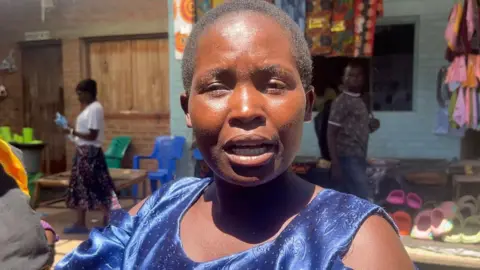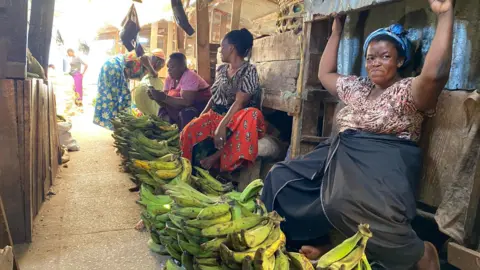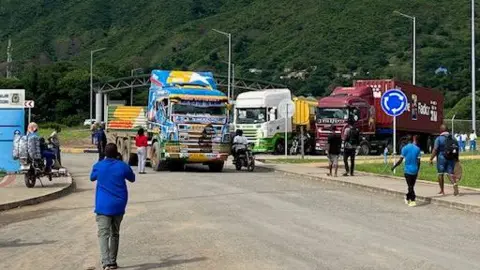'My bananas were seized and destroyed' - Malawi-Tanzania trade row escalates
 BBC / Sammy Awami
BBC / Sammy AwamiTraders are counting their losses as Tanzania clamps down on people trying to flout a ban on goods from neighbouring Malawi in an escalating regional trade row.
On Friday, businesswomen told the BBC that some fellow traders had been arrested on the second day of a ban imposed by Tanzania on all agricultural imports from Malawi and South Africa.
"My bananas were seized and destroyed. Right now, our business has brought losses, and we only have a little money left," said Jestina Chanya, a trader in Karongo, about 50km (30 miles) from the border with Tanzania.
Diplomatic efforts to address the dispute have failed but Tanzania's agriculture minister said fresh talks were ongoing.
 BBC / Sammy Awami
BBC / Sammy AwamiLast month, Malawi blocked imports of flour, rice, ginger, bananas and maize from Tanzania, and other countries, saying this was to protect local producers.
South Africa has for years prohibited the entry of bananas from Tanzania.
On Thursday, Tanzania's Agriculture Minister Hussein Bashe said trade restrictions from those two countries "directly affected" traders from his country and described the trade barrier as "unfair and harmful".
Bashe announced an immediate ban on all agricultural imports from the two countries, "to protect our business interests".
Trade flows have been greatly affected at Kasumulu – the official border crossing between Tanzania and Malawi.
 BBC / Sammy Awami
BBC / Sammy AwamiWhen the BBC visited the Malawian town of Karonga, traders - mostly women - said they were still shaken by the sight of tonnes of their produce slowly rotting, then ultimately being dumped after being denied entry into Tanzania.
"The losses I have incurred are big because I can't go buy anything any more, and I don't even know how I will feed my children," said June Mwamwaja.
But Tanzanian traders have also been hit.
On Saturday Tanzania's agriculture minister posted a video on social media showing a pile of rotten bananas in a truck which had been prevented from entering Malawi.
Tonnes of tomatoes also spoiled at the border recently after lorries from Tanzania were denied entry into Malawi.
Malawian traders like Jeniffa Mshani said they preferred agricultural goods from Tanzania because it was easier and more affordable to source them across the border.
"Tanzanian products are big and sell very well in the market, and their prices are good. Our local [Malawi] products are more expensive. I have nothing to do - I don't have the capacity to compete with those [who have big capital]. I just can't," she told the BBC.
They said Tanzanian produce, especially potatoes, were larger and of better quality.
Others said their customers preferred Tanzanian plantains over Malawian ones, describing the former as tastier, while the latter were often spongy.
 BBC / Sammy Awami
BBC / Sammy AwamiBut since Thursday, Malawian authorities, both at the border and in nearby markets, have become increasingly strict – often arresting traders found with Tanzanian produce.
"When we bring goods from Tanzania, they turn us back. One of us was stopped and arrested right at the border," another trader said.
Some of them said they had no idea why they were being blocked while some rich business people were still allowed to transport goods across the border.
"They are targeting us who have little capital, while those with big money are still bringing in goods," said Ms Chanya, who sells potatoes and bananas in Karonga market.
Following the crackdown, some traders have resorted to selling their goods in secret, afraid to display them openly for fear of arrest.
"We only carry three or four bunches [of bananas], just to earn a living for the children," said Evelina Mwakijungu, adding: "But our large consignments have been blocked, so we have no business - we're struggling with our families".
The normally bustling border crossing of Kasumulu remained noticeably quieter than usual with drivers seen relaxing in the shade of trees, while others played draughts or lounged in the back of their lorries.
They declined to be quoted directly but explained that they were simply waiting for word from their bosses on what to do next.
On a normal day, more than 15 lorries loaded with agricultural produce would cross the border, drivers told the BBC.
Malawi's trade ministry spokesperson Patrick Botha told local media that they were yet to get official communication on the issue.
"We are hearing [about] this from social media. At an appropriate time, we will comment," he was quoted as saying.
Malawi has become an increasingly important market for Tanzanian goods in recent years, with exports trebling between 2018 and 2023, according to official Tanzanian figures.
But landlocked Malawi, which has relied on Tanzanian ports to carry its exports such as tobacco, sugar and soybeans to the rest of the world, will have to reroute its goods.
It is not yet clear how hard South Africa, which exports various fruits, including apples and grapes, to Tanzania, will be hit by the ban. South African authorities are yet to comment.
The row comes at a time when Africa is supposed to be moving towards greater free trade through the establishment of a continent-wide free-trade area, which began operating four years ago.
Additional reporting by Wycliffe Muia
You may also be interested in:
 Getty Images/BBC
Getty Images/BBCGo to BBCAfrica.com for more news from the African continent.
Follow us on Twitter @BBCAfrica, on Facebook at BBC Africa or on Instagram at bbcafrica
